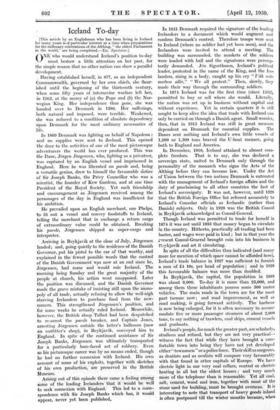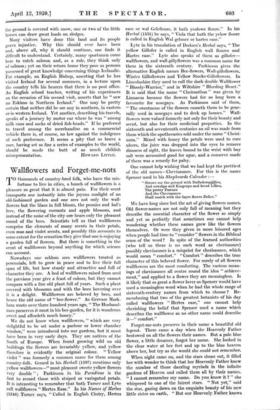Iceland To-day
[This article by an Englishman who has been living in Iceland for many years is of particular-interest at a time when prepirations for the millenary celebrations of the Althing, " the oldest Parliament in the world," are being completed.—En. Spectator.] ON who would understand Iceland's position to-day must bestow a little attention on her past, for the simple reason that no other nation can show a parallel development. Having established herself, in 87'7, as an independent Commonwealth, governed by her own chiefg, she flour- ished until the beginning of the thirteenth century, when some fifty years of internecine warfare left her, in 1262, at the mercy of (a) the Pope and (b) the Nor- wegian King. Her independence thus gone, she was handed over to Denmark in 1880. Her sufferings, both natural and imposed, were terrible. Weakened, she was reduced to a condition of absolute dependency upon Denmark for the most ordinary necessaries of life.
In 1809 Denmark was fighting on behalf of Napoleon ; and no supplies were sent to %Iceland. This opened the door to the activities of one of the most picturesque adventurers the world has ever produced. This was the Dane, Jorgen Jorgensen, who, fighting as a privateer, was captured by an English vessel and imprisoned in England. Here he was liberated On parole and, being a versatile genius, drew to himself the favourable notice of Sir Joseph Banks, the Privy Councillor who was a scientist, the founder of Kew Gardens, and" at one time President of the Royal Society. Yet such friendship and encouragement as 'Jorgensen received among the personages of the day in England was insufficient for his ambition.
He prevailed upon an English merchant, one Phelps, to fit out a vessel and convey foodstuffs to Iceland, telling the merchant that in exchange a return cargo Of extraordinary value could be obtained. Breaking his parole, Jorgensen shipped as super-cargo and interpreter.
' Arriving in Reykjavik at the close of July, Jorgensen landed; and, going quietly to the residence of the Daniih Governor, put his 'pistol to the ear of that worthy, and explained in the fewest possible words that the control Of the-Danish Government 'was now at an end since he, .Iorgenten, had come and would rule Iceland: The morning being Sunday and the great majority of the people at church, his action went unopposed. Later the position was discussed, and the Danish CoVernor made the grave mistake of insisting atill upon the -Monet- poly of all trade, actually refusing to allow the well-nigh starving Icelanders to purchase food from the new- comers. This strengthened Jorgensen's position, and for some weeks he actually ruled Iceland. Meanwhile, however, the British sloop Talbot had been deSpatched to re-arrest the parole breaker, and Captain Jones; arresting Jorgensen outside the latter's ballroom (now an Outfitter's shop), in Reykjavik, conveyed him to England. In spite of the continued assistance of Sir Joseph Banks, Jorgensen was ultimately transported for a particularly bare-faced act of robbery. Even so his picturesque career was by no means-ended; though he had no further connexion with Iceland. His own account of some of his exploits, together with sketches of his own production; - are 'preserved the -British Museum-. ' . - Arising. out of this episode there came a feeling among Some of the leading Icelanders' that it would be • well to seek connexion with England. This led- to a Corre- spondence with Sir Joseph Banks which -has, it would appear, never yet- been published, In 1851 Denmark required the signature of the leading Icelanders to a document which would augment and confirm Denmark's control. Therefore troops were sent to Iceland (where no soldier had yet been seen), and the Icelanders were invited to attend a meeting. The building was surrounded, the muskets of the soldiers were loaded with ball and the signatures were peremp- torily demanded. Jon Sigurthsson, Iceland's political leader, protested in the name of the King, and the Ice. landers, rising, in a body, caught up his erT" Yith nuelum allir," " We all protest." Then, slowly, they made their way through the surrounding soldiers.
_ In 1874 Iceland was for the first time (since 1262), permitted to buy _ or sell where she would. Literally, the nation was set up in business without capital and without experience., Yet in certain quarters it is still sought to keep alive the idea that trade with Iceland can only be carried on through a Danish agent. Small wonder, then, that in 1915 Iceland was still in great measure dependent on Denmark for essential supplies. The Danes sent nothing and Iceland's own little vessels of 1,200 or 1,500 tons braved the U-boat menace, going both to England and America.
In December, 1918, Iceland attained to almost com- plete freedom. That is to say, she was . declared a sovereign state, united to Denmark only through the personality of the monarch who signs the Acts of the Althing before they - can become law. Under the Act of Union between the two nations Denmark is entrusted with the management of Iceland's foreign affairs and the duty of proclaiming to all other countries the fact of Iceland's sovereignty. It was not, however, until 1928 that the British Foreign Office list referred accurately to Iceland's Consular officials as Icelandic (rather than Danish) subjects. Only in 1928 was the British Consul in Reykjavik acknowledged as Consul-General.
Though Iceland was permitted to trade for herself in 1874 it was not until 1895 that money began to circulate in the country. Hitherto, practically all trading had been barter, and wages were paid- in kind ; but in that year the present Consul-General brought coin into his business in Reykjavik and set it circulating.
In spite of all the difficulties thus indicated (and, many more for mention of which space cannot be afforded here), Icelarid'S trade balance in 1.927 was sufficient to furnish a sum' of 'L4 10s. per -head of population ; and in 1928 this favourable balance was more than doubled.
In Reykjavik, the capital, the population in 1889 was about 3,000: To-day it is more than- 25,000, and among them these inhabitants possess some 500 motor vehicles. The Main roads in the town are for the most part tarmac now ; and road improvement, as well as road making, is going forward actively. The - harbour is now being' enlarged, for it is often"necessary to accom- modate five or more passenger steamers of about 2,000 tons, to say nothing of trawlers; coal ships, cement vessels and gunboats.
Iceland's people, for much the greater part, are scholarly, studious and refined, but they are not very practical-- witness the fact that while they have brought a com- fortable town into being they have not yet developed either " townsmen " or a police force. Their skill as surgeons, as dentists and as -oculists will compare very favourably with that found in other capitals of Europe: We, have electric light in our very coal cellars, central- or- electric heating in all but the oldest houses ; and very much more of the telephone than is reasonable. Yet all coal, salt, cement, wOod and iron, together with mist. of the stone used for building, must be brought overseas. It is interesting to note that transport of heavy goods inland, is often postponed till the winter months because, when the ground is covered with snow, one or two of the little horses can draw great loads on sledges.
Many visitors have done this land and its people grave injustice. Why this should ever have been and, above all, why it should continue, one finds it difficult to understand. Certainly, many sportsmen come here to catch salmon and, as a rule, they think only of salmon ; yet on their return home they pose as persons possessed of great knowledge concerning things Icelandic. For example, an English Bishop, asserting that he has visited Iceland for several summers, in a lecture upon the country tells his hearers that there is no post office. An English school teacher, writing of his experiences on the occasion of his second visit, asserts that he " saw no Eskimo in Northern Iceland." One may be pretty certain that neither did he see any in southern, in eastern or in western Iceland. Yet another, describing his travels, speaks of a journey by motor car where he was " among milk cans and sacks of dried fish-heads." If he preferred to travel among the merchandise on a commercial vehicle there is, of course, no law against the indulgence of such preference. It seems a pity that so brave a race, having set so fine a series of examples to the world, should be made the butt of so much childish



























































 Previous page
Previous page